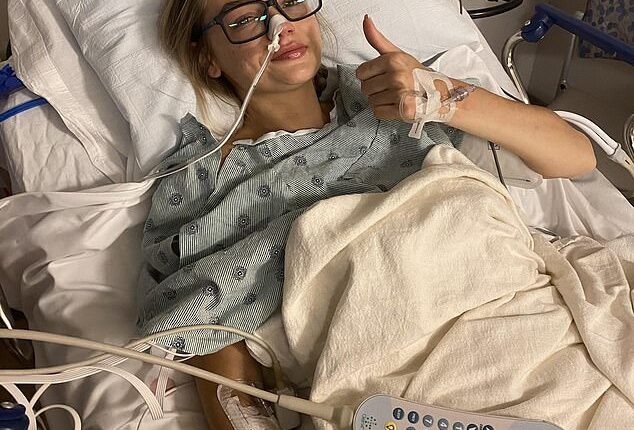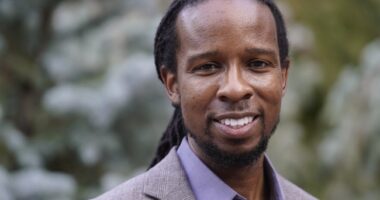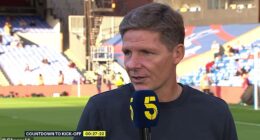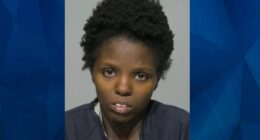A young woman who was told by doctors that her symptoms were ‘all in her head’ for years has laid bare her terrifying health battle that left her in excruciating pain and needing multiple surgeries.
Hannah Grippi had always led a healthy, active life when she started to experience seemingly-normal issues like bloating and fatigue – which she put down to caffeine or carb-heavy meals.
But when the 26-year-old lost a dramatic amount of weight in a short period without trying, she knew something sinister was at play.
It marked the start of a five-year journey to getting answers and two major procedures that ultimately left her unable to live like any other ‘normal’ 20-something.
For Hannah, the early warning signs that something was amiss were eerily subtle.
‘At the time, I was in college and attributed it to stress or typical lifestyle changes,’ the nurse, from Pennsylvania, told NeedToKnow recently.
‘But when I lost over 20 pounds in just a few months without trying, I knew something was seriously wrong.
‘The signs were subtle at first – bloating after eating, fatigue, upper abdominal pressure and pain, especially after caffeine or carb-heavy meals.

A young woman who was told by doctors that her symptoms were ‘all in her head’ for years has laid bare her terrifying health battle that left her in excruciating pain and needing surgery

Hannah Grippi had always led a healthy, active life when she started to experience seemingly-normal issues like bloating and fatigue – which she put down to caffeine or carb-heavy meals
‘I started by changing my diet, thinking it was something I could fix on my own.
‘When that didn’t help, I went to a GI specialist who quickly dismissed my concerns, chalking it up to anxiety from nursing school.’
But Hannah’s pain became ‘relentless’ – and impossible for her to ignore.
She continued: ‘It felt like my upper abdomen was being squeezed from the inside like there was a tight fist around my organs that never let up, especially when I ate or drank anything.
‘It wasn’t just discomfort, it was debilitating. Every meal felt like a punishment. The pressure would build so intensely that it made it hard to breathe or think straight. It completely took over my life.’
Hanna said medical professionals would ‘downplay’ her symptoms or simply ‘blame it on stress,’ leaving her questioning her self.
‘I knew something was wrong, but the people I turned to for help either downplayed it or blamed it on stress,’ she said.
‘I started to question myself, was I overreacting? Was this just in my head?

But when the 26-year-old lost a dramatic amount of weight in a short period without trying, she knew something sinister was at play

It marked the start of a five-year journey to getting answers and two major procedures that ultimately left her unable to live like any other ‘normal’ 20-something

Hanna said medical professionals would ‘downplay’ her symptoms or simply ‘blame it on stress,’ leaving her questioning her self
‘That kind of doubt seeps in slowly and makes you feel completely alone in your own body.
‘Looking back, the emotional impact of not being believed was just as damaging as the physical symptoms I was living with.’
Hannah, whose health issues started back in 2018, insisted on undergoing ‘endless’ tests, from endoscopies and colonoscopies to bloodwork and GI panels.
She explained: ‘Everything came back “normal,” which led to repeated dismissal and gaslighting by medical professionals.
‘Eventually, it was my primary care doctor – who I had only seen twice – who finally took me seriously.’
Her doctor ordered an ultrasound of her abdomen, which found over 80 percent compression of Hannah’s celiac artery – an indicator of a rare condition where a ligament in the chest compresses the artery and nearby nerves, causing abdominal pain.
A CT scan in May 2023 – five years after her health problems first began – confirmed the diagnosis of Median Arcuate Ligament Syndrome (MALS).
Hannah said: ‘It was incredibly validating to finally hear “this is real” after years of being told it was all in my head.

‘The doubt seeps in and makes you feel completely alone in your own body,’ she shared. ‘The emotional impact of not being believed was just as damaging as the physical symptoms’

Hannah, whose health issues started back in 2018, insisted on undergoing ‘endless’ tests, from endoscopies and colonoscopies to bloodwork and GI panels
‘I was relieved to finally have an answer, but it was also heartbreaking because I realized how much unnecessary suffering I endured due to not being believed.’
The following month, Hannah underwent open vascular and abdominal surgery, where her surgeon released the median arcuate ligament and reconstructed her diaphragm.
But sadly, a few months later, the familiar pain returned, and once again, she was ‘dismissed.’
‘My original surgeon didn’t seem to believe that MALS could come back,’ she shared. ‘He just dismissed it entirely and acted like it wasn’t his concern anymore.’
Trusting her gut, Hannah sought a second opinion – and this surgeon confirmed her MALS had returned, and booked her in for a second surgery in November 2024.
Believed to be a result of the trauma of the two surgeries, Hannah has since developed gastroparesis – a disorder that slows or stops the movement of food from the stomach to small intestine, essentially leaving the stomach paralyzed.
She also now has Postural orthostatic tachycardia syndrome (POTS) – which occurs when the heart rate increases very quickly after standing up or lying down.
‘These are days I feel like my body is a puzzle I can’t solve,’ she detailed. ‘It’s exhausting to keep navigating new symptoms when you’re already worn down. But I try to remind myself of how far I’ve come.’

She finally got answers after a doctor ordered an ultrasound of her abdomen, which found over 80 percent compression of Hannah’s celiac artery – an indicator of a rare condition

A CT scan in May 2023 confirmed the diagnosis of Median Arcuate Ligament Syndrome (MALS). The following month, Hannah underwent open vascular and abdominal surgery
While she is recovering well from her second surgery – with the MALS pain mostly gone – life has changed forever for the young nurse.
She said: ‘I don’t live like a typical 26-year-old. My energy is limited and my days have to be planned carefully.
‘I have good days and really tough days. I’m still recovering, still learning to listen to my body, and still grieving what my health used to look like.
‘While the original issue has improved, the ripple effects are still very present in my daily life.
‘But I’m also grateful – to the surgeon who listened, to the diagnosis that gave me a direction, and to the incredible chronic illness community I’ve found through it all.’
She’s been sharing her journey online, and has been moved by the public response she has received.
‘Sharing my journey online has helped not only me, but others,’ gushed the 26-year-old.
‘I’ve been able to help people get diagnosed or find the courage to push for answers – and that has been incredibly rewarding.’

But sadly, a few months later, the familiar pain returned, and she had to undergo a second surgery. She’s seen showing off her scar

Now, Hannah is focusing on her continued recovery, working with a functional medicine doctor to help manage her ongoing symptoms
Now, Hannah is focusing on her continued recovery, working with a functional medicine doctor to help manage her ongoing symptoms, and trying to enjoy a slow life with her husband, Luca, who she married last year.
Hannah is passionate about empowering other people struggling with their health to push for answers – something that has left her stronger than ever.
She concluded: ‘Living with chronic illness is not for the weak. It’s exhausting, isolating, and often invisible.
‘My biggest advice to anyone struggling with their health is: advocate for yourself. Push for answers and trust your body.
‘You are the expert of your own experience. For a long time, I felt lost in my own body – trapped in symptoms no one could explain and exhausted from fighting to be heard.
‘The journey through chronic illness has been anything but easy. It’s been filled with unanswered questions, moments of fear, and a deep grief for the life I thought I’d have.
‘But along the way, I’ve also discovered a strength I didn’t know I had. I’ve learned to slow down, to listen to my body, and to find beauty in small moments of peace.
‘My greatest wish in sharing my story is that other people will feel seen, understood, and reminded that even in the hardest seasons, healing is still possible.’








